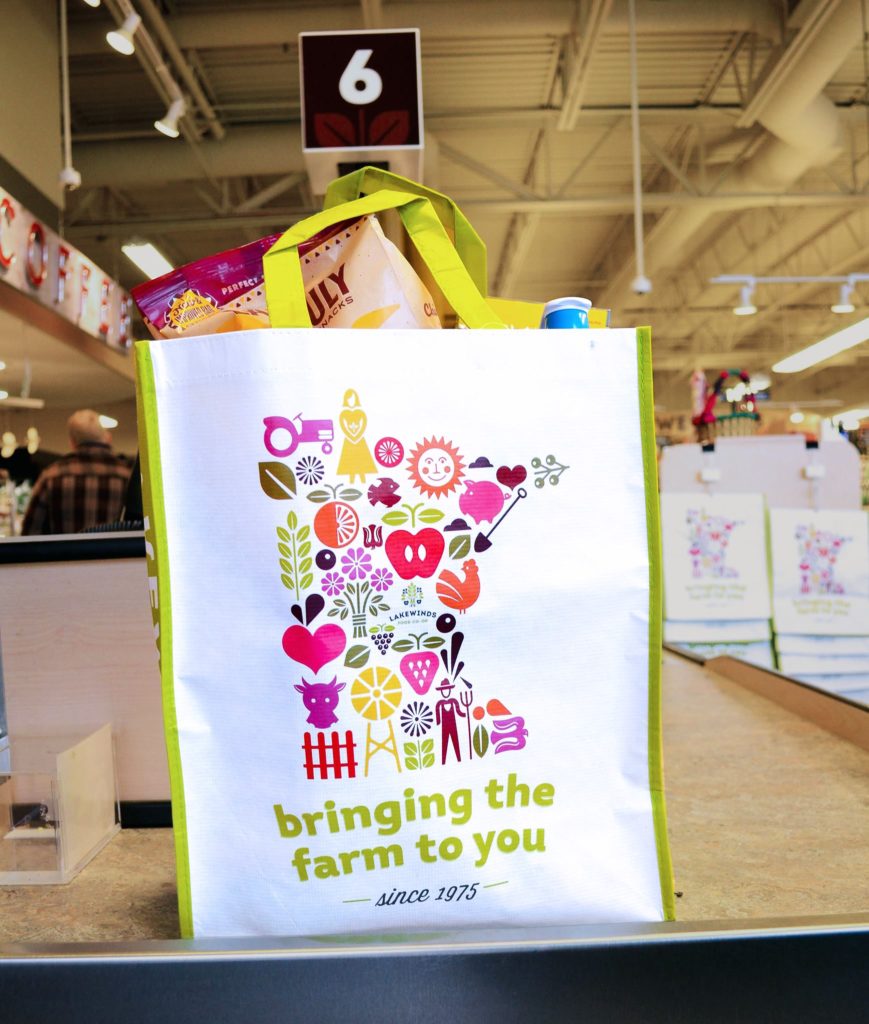The Minneapolis Bag Ban 101

Here’s what you need to know about the Minneapolis plastic bag ban (and its exceptions) starting on June 1, 2017. This ban hopes to change consumers’ habits in order to get the city closer to its zero-waste goals as it looks to the future, which is a mission we proudly stand behind!
- Minneapolis stores will stop providing any bags that are not a recyclable paper bag (we love this!) and will charge a five cent pass-through charge for each paper carryout bag, compostable carryout bag or reusable bag provided to customers. The exception will be any customers with a voucher or electronic benefits card issued under the Women, Infants and Children (WIC) or Temporary Assistance to Needy Families (TANF) support programs, or the federal Supplemental Nutrition Assistance Program (SNAP, also known as Basic Food), or a recognized Minnesota food assistance program.
- Some customers might find themselves charged a nickel for paper bags, though businesses will have an option to eat that fee themselves. At Lakewinds, paper bags are free to customers, and using a reusable bag results in a five cent donation to local charities.
- Some fear the cost of groceries will rise due to this ordinance or as the ban spreads to other cities. That will never be the case at Lakewinds!
- An amendment to this bill gives Minneapolis businesses the option of contributing to a litter cleanup fund instead of charging customers a five cent fee for paper bags.
- This ban does not include plastic bags used to wrap produce (like the small bags on rollers in our produce aisle), flowers, baked goods, takeout foods, newspapers and dry-cleaning or laundry.
- Bags that will now cost five cents are any paper or plastic “carryout bags” provided by a store at its checkout stand, cash register, point of sale system, or any “other point of departure to a customer for the purpose of transporting food or merchandise out of the establishment.”
- The bag ban does not include: bags without handles used by customers inside stores to package bulk items such as fruit, vegetables, nuts, grains, candy, greeting cards, or small hardware items, such as nails and bolts, or to contain or wrap frozen foods, meat or fish, whether prepackaged or not, or to contain or wrap flowers or potted plants, or other items where dampness may be a problem, or to contain unwrapped prepared foods or bakery goods, or to contain prescription drugs, or bags used to safeguard public health and safety during the transportation of prepared take-out foods and prepared liquids intended for consumption away from the retail establishment, newspaper bags, door-hanger bags, laundry-dry cleaning bags, bags used to protect fine art paper, or bags sold in packages containing multiple bags intended for use as garbage, pet waste, or yard waste bags.
- Compostable carryout bags (that are not part of the ban) will need to meet the ASTM D6400 standard, be certified for compostability by the Biodegradable Products Institute and display the BPI logo.
- The five cent “pass-through charge” means a charge will be collected by retailers from their customers when providing recyclable paper bags or reusable plastic bags, and retained by retailers to offset the cost of bags and other costs related to the pass-through charge.
- Any paper carryout bag must meet the following requirements: contains a minimum average of forty percent post-consumer recycled materials and displays the minimum percent of post-consumer content on the outside of the bag. (We love seeing other stores get behind recycled material paper bags!)
- Reusable bags will never be part of the ban–Any bag made of cloth, fiber, or other machine washable fabric or durable plastic that can be cleaned and disinfected regularly is considered “reusable”. The new bag ban standards will require reusable bags to be at least four mils thick, be specifically designed for a minimum lifetime use of 75 uses, and have the ability to carry at least 18 pounds.
- “Single-use plastic carryout bags” will be prohibited in Minneapolis. This encompasses any carryout bag made from plastic that is neither intended nor suitable for continuous reuse as a carryout bag or that is less than four (4) mils thick.
- At many Minneapolis stores, your receipts will now indicate the number of paper carryout bags, compostable carryout bags and/or reusable bags provided and the total amount of the pass-through charge for your purchases.
- Minneapolis has also approved a plan to develop a city recycling program for any remaining plastic bags and the plastic film used as wrapping on many products.
Three cheers for the city of Minneapolis as we all move toward more sustainable shopping trips and a greener state together!
